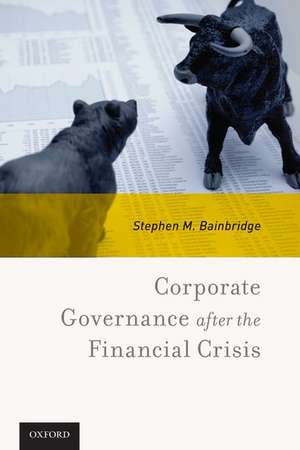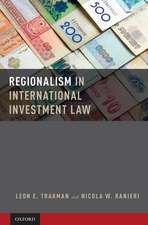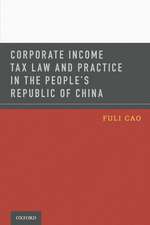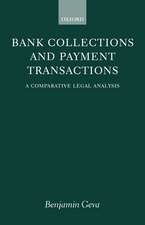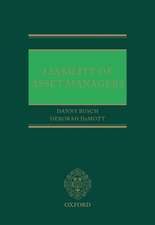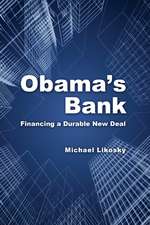Corporate Governance after the Financial Crisis
Autor Stephen M. Bainbridgeen Limba Engleză Paperback – 14 apr 2016
| Toate formatele și edițiile | Preț | Express |
|---|---|---|
| Paperback (1) | 274.04 lei 32-37 zile | |
| Oxford University Press – 14 apr 2016 | 274.04 lei 32-37 zile | |
| Hardback (1) | 558.34 lei 32-37 zile | |
| Oxford University Press – 16 feb 2012 | 558.34 lei 32-37 zile |
Preț: 274.04 lei
Preț vechi: 340.83 lei
-20% Nou
Puncte Express: 411
Preț estimativ în valută:
52.44€ • 54.64$ • 43.42£
52.44€ • 54.64$ • 43.42£
Carte tipărită la comandă
Livrare economică 24-29 martie
Preluare comenzi: 021 569.72.76
Specificații
ISBN-13: 9780190496678
ISBN-10: 0190496673
Pagini: 308
Dimensiuni: 156 x 234 x 16 mm
Greutate: 0.43 kg
Editura: Oxford University Press
Colecția OUP USA
Locul publicării:New York, United States
ISBN-10: 0190496673
Pagini: 308
Dimensiuni: 156 x 234 x 16 mm
Greutate: 0.43 kg
Editura: Oxford University Press
Colecția OUP USA
Locul publicării:New York, United States
Recenzii
Stephen Bainbridge is not only an expert on corporate governance and an academic whose ideas and writing have changed the way we think about corporations. Professor Bainbridge is also one of the most perceptive academic commentators on the federal government's regulation of corporate governance. In Corporate Governance after the Financial Crisis, Professor Bainbridge has written an important book for those seeking to understand the theoretical and practical implications of Dodd-Frank, Sarbanes-Oxley and the federal government's foray into corporate regulation. It is a book that for years to come will influence the controversial debate over the federal regulation of corporate governance."
In this important work, Stephen Bainbridge exposes the flaws in the modern notion that corporations should be treated as little democracies, and shows how this erroneous idea influenced the framing of both the Sarbanes-Oxley Act and the Dodd-Frank Act. If there is ever to be a repeal or significant modification of the corporate governance provisions in these destructive laws, it will be driven by the scholarly work in this book."
Stephen Bainbridge's outstanding book, Corporate Governance after the Financial Crisis, is a 'must read' not only for corporate scholars, but also (and perhaps more importantly) for federal policy makers. Professor Bainbridge incisively peels away the layers of the onion that encapsulate the complex issues lying at the heart of corporate governance and principles of federalism. This superb work cogently reveals the policy reasons why corporate governance must continue to be purely a matter of internal affairs of the states of incorporation. He argues convincingly why crisis-driven paroxysms of federalization of corporate governance (epitomized by Sarbanes-Oxley and Dodd-Frank) are wrong-headed and must continue to be vigorously resisted at the state and federal levels."
Bainbridge summarizes a wide variety of empirical evidence and gives clear explanations of all relevant legalese...It is extremely well researched, thorough, and persuasive in concluding that the federalization of corporate governance facilitated by Sarbanes-Oxley and Dodd-Frank constitutes 'quack corporate governance regulation.'"
Professor Stephen M. Bainbridge's Corporate Governance After the Financial Crisis presents a cogent discussion of the congressional and regulatory reaction to two significant economic crises within the past decade and the unprecedented federal expansion into the traditional state bulwark of corporate law that resulted...For those trying to understand the state of corporate governance regulation today and the key debates and tensions that are at work, Bainbridge's book is a must read."
In this important work, Stephen Bainbridge exposes the flaws in the modern notion that corporations should be treated as little democracies, and shows how this erroneous idea influenced the framing of both the Sarbanes-Oxley Act and the Dodd-Frank Act. If there is ever to be a repeal or significant modification of the corporate governance provisions in these destructive laws, it will be driven by the scholarly work in this book."
Stephen Bainbridge's outstanding book, Corporate Governance after the Financial Crisis, is a 'must read' not only for corporate scholars, but also (and perhaps more importantly) for federal policy makers. Professor Bainbridge incisively peels away the layers of the onion that encapsulate the complex issues lying at the heart of corporate governance and principles of federalism. This superb work cogently reveals the policy reasons why corporate governance must continue to be purely a matter of internal affairs of the states of incorporation. He argues convincingly why crisis-driven paroxysms of federalization of corporate governance (epitomized by Sarbanes-Oxley and Dodd-Frank) are wrong-headed and must continue to be vigorously resisted at the state and federal levels."
Bainbridge summarizes a wide variety of empirical evidence and gives clear explanations of all relevant legalese...It is extremely well researched, thorough, and persuasive in concluding that the federalization of corporate governance facilitated by Sarbanes-Oxley and Dodd-Frank constitutes 'quack corporate governance regulation.'"
Professor Stephen M. Bainbridge's Corporate Governance After the Financial Crisis presents a cogent discussion of the congressional and regulatory reaction to two significant economic crises within the past decade and the unprecedented federal expansion into the traditional state bulwark of corporate law that resulted...For those trying to understand the state of corporate governance regulation today and the key debates and tensions that are at work, Bainbridge's book is a must read."
Notă biografică
Stephen M. Bainbridge is the William D. Warren Distinguished Professor of Law at UCLA, where he teaches Business Associations, Advanced Corporation Law and a seminar on corporate governance. He has also taught at Harvard Law School as the Joseph Flom Visiting Professor of Law and Business, La Trobe University in Melbourne, and at Aoyama Gakuin University in Tokyo. In 2008, Professor Bainbridge received the UCLA School of Law's Rutter Award for Excellence in Teaching. Also, in 2008, he was named by Directorship magazine to its list of the 100 most influential people in the field of corporate governance.Professor Bainbridge is a prolific scholar. He has written over 75 law review articles which have appeared in such leading journals as Harvard Law Review, Virginia Law Review, Northwestern University Law Review, Cornell Law Review, Stanford Law Review, and Vanderbilt Law Review. His most recent books include: The New Corporate Governance in Theory and Practice (Oxford University Press, 2008); Securities Law-Insider Trading (2nd ed., 2007); Business Associations: Cases and Materials on Agency, Partnerships, and Corporations (6th ed., 2006) (with Klein and Ramseyer); Agency, Partnerships, and Limited Liability Entities: Cases and Materials on Unincorporated Business Associations (2nd ed., 2007) (with Klein and Ramseyer); Agency, Partnerships & LLCs (2004); Corporation Law and Economics (2002).Professor Bainbridge currently serves on the American Bar Association's Committee on Corporate Laws and on the Editorial Advisory Board of the Journal of Markets and Morality.
